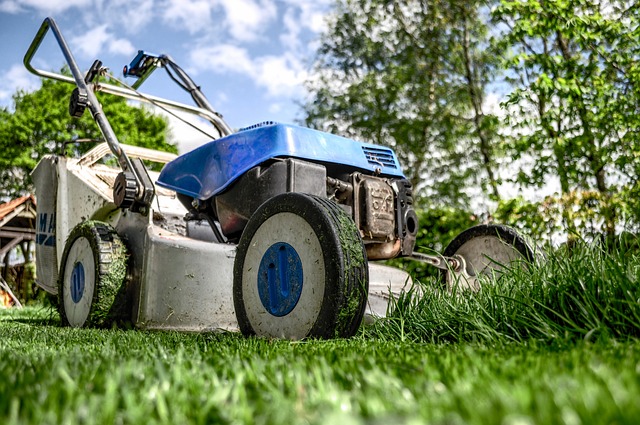Yard waste removal and recycling are pivotal practices for sustainable landscaping, effectively reducing environmental impact by diverting organic matter from landfills. By composting grass clippings, leaves, and food scraps, homeowners can enrich their soil naturally, eliminating the need for chemical fertilizers and curbing methane emissions. Mulching conserves soil moisture and improves its health, also lessening mowing frequency. These practices not only benefit local ecosystems but also align with broader sustainability goals, creating a resilient and environmentally conscious landscape for future generations. Additionally, yard waste can be repurposed into eco-friendly barriers, wildlife habitats, or sources of renewable biomass energy, further underscoring the importance of these recycling efforts. Engaging with community composting programs facilitates this process and enhances overall environmental health. Homeowners who utilize yard waste removal and recycling services actively participate in waste reduction and support biodiversity, contributing to a more sustainable global resource management system. Yard waste removal and recycling is an essential component of eco-friendly living strategies, offering tangible benefits for both individual gardens and the larger community's ecological footprint.
Maintaining a yard with an eye on sustainability not only nurtures local ecosystems but also contributes to global environmental health. This article delves into eco-friendly yard maintenance practices that transform your outdoor space into a thriving sustainable landscape. By focusing on composting organic waste and leveraging local yard waste removal and recycling programs, you can significantly reduce environmental impact. Discover how these practices foster healthy soil, conserve water, and support biodiversity while also highlighting the importance of yard waste removal and recycling in promoting a greener planet.
- Eco-Friendly Yard Maintenance Practices for Sustainable Landscapes
- Composting Organic Yard Waste: A Zero-Waste Approach to Yard Upkeep
- Utilizing Local Yard Waste Removal and Recycling Programs to Promote Environmental Health
Eco-Friendly Yard Maintenance Practices for Sustainable Landscapes

Engaging in eco-friendly yard maintenance practices is a cornerstone of sustainable landscaping. By adopting these methods, homeowners can significantly reduce their environmental footprint while keeping their yards healthy and beautiful. One key aspect of this approach is the proper management of yard waste. Instead of sending grass clippings, leaves, and brush to landfills, consider recycling this organic matter. Composting is an excellent solution; it transforms yard waste into nutrient-rich soil amendments that can enhance garden soil, reduce the need for chemical fertilizers, and cut down on methane emissions from decomposing organic material in landfills. Another sustainable practice is mulching, which reduces the frequency of mowing and the amount of grass clippings produced, thus conserving soil moisture and improving soil quality.
Yard waste removal and recycling also extend beyond composting. Yard trimmings can be repurposed into erosion control barriers, wildlife habitats, or even as a source of renewable biomass energy. Municipal yard waste programs often collect organic materials for composting, diverting these materials from landfills and creating community-level environmental benefits. By actively participating in yard waste removal and recycling initiatives, individuals contribute to the health of their local ecosystems and support broader sustainability goals. This not only minimizes the ecological impact of yard maintenance but also fosters a more resilient and sustainable landscape for future generations.
Composting Organic Yard Waste: A Zero-Waste Approach to Yard Upkeep

Participating in yard waste removal and recycling through composting is a pivotal step toward sustainable garden maintenance. By diverting organic yard waste from landfills, homeowners can significantly reduce their environmental footprint. Composting not only serves as a natural fertilizer for soil, enriching it with vital nutrients, but also breaks down yard trimmings and food scraps into humus, a conditioner that fosters plant growth in an eco-friendly manner. This process recycles organic matter back into the earth, creating a closed-loop system that supports both plant health and soil biodiversity.
Implementing a composting system for yard waste removal is straightforward and can be tailored to the size and needs of any garden. It begins with identifying suitable composting materials such as leaves, grass clippings, fruit and vegetable peels, and coffee grounds. These materials are then layered in a compost bin or pile, balancing greens (nitrogen-rich) and browns (carbon-rich) to ensure optimal decomposition. Regularly turning the compost accelerates the breakdown process and prevents odors or pests from becoming an issue. By adopting this zero-waste approach to yard upkeep, individuals contribute to a healthier planet, minimizing waste and promoting the sustainable use of resources.
Utilizing Local Yard Waste Removal and Recycling Programs to Promote Environmental Health

Engaging in sustainable yard maintenance practices begins with understanding the role of local yard waste removal and recycling programs in promoting environmental health. These programs are designed to manage organic waste responsibly, transforming it into nutrient-rich compost or mulch that can enrich soil rather than contributing to landfill waste. By participating in these initiatives, homeowners not only reduce their carbon footprint but also support local ecosystems. The benefits extend beyond individual yards; on a community scale, these programs divert significant volumes of organic matter from entering the waste stream, thereby lessening methane emissions from landfills and preserving biodiversity. It is imperative to familiarize oneself with the specific guidelines and offerings in one’s municipality to maximize the positive environmental impact of yard maintenance activities.
Homeowners can contribute to these efforts by segregating yard waste and ensuring it is set out for collection according to the scheduled pickups. This segmentation minimizes contamination and ensures that the collected materials are processed efficiently. Furthermore, utilizing these services often means accessing high-quality compost, which can be used to improve garden soil, reduce the need for chemical fertilizers, and support sustainable landscape practices. By leveraging yard waste removal and recycling programs, individuals can play a pivotal role in creating a more sustainable environment, making these initiatives an indispensable component of eco-friendly yard maintenance.
In conclusion, adopting sustainable yard maintenance practices is not just beneficial for the environment but also fosters a healthier community. By implementing eco-friendly strategies such as those highlighted in ‘Eco-Friendly Yard Maintenance Practices for Sustainable Landscapes’ and ‘Composting Organic Yard Waste: A Zero-Waste Approach to Yard Upkeep,’ homeowners can significantly reduce their environmental footprint. Furthermore, leveraging local yard waste removal and recycling programs, as discussed in ‘Utilizing Local Yard Waste Removal and Recycling Programs to Promote Environmental Health,’ ensures that yard waste is repurposed rather than contributing to landfill waste. Embracing these practices not only contributes to the sustainability of our surroundings but also creates a more resilient ecosystem for future generations. It’s a collective effort towards a greener, cleaner planet, starting from the ground up.

